Literature Review: Colonization and Aboriginal Health
VerifiedAdded on 2022/10/02
|8
|1813
|14
Literature Review
AI Summary
This literature review examines the profound impact of colonization on the health of Aboriginal and Torres Strait Islander peoples in Australia. The paper explores how historical factors, particularly land dispossession, have contributed to significant health inequalities within Indigenous communities. The review synthesizes research from multiple sources, highlighting the link between colonization and adverse health outcomes such as mental health disorders, cardiovascular diseases, and economic disparities. The paper emphasizes the role of social determinants of health, including historical trauma, cultural disruption, and systemic racism, in shaping the health landscape. The review concludes by advocating for land repossession as a critical step towards addressing health disparities and promoting self-determination within Aboriginal and Torres Strait Islander communities. It highlights the need for a broader understanding of colonialism as a social determinant of health, as well as the importance of culturally sensitive healthcare practices and policies.
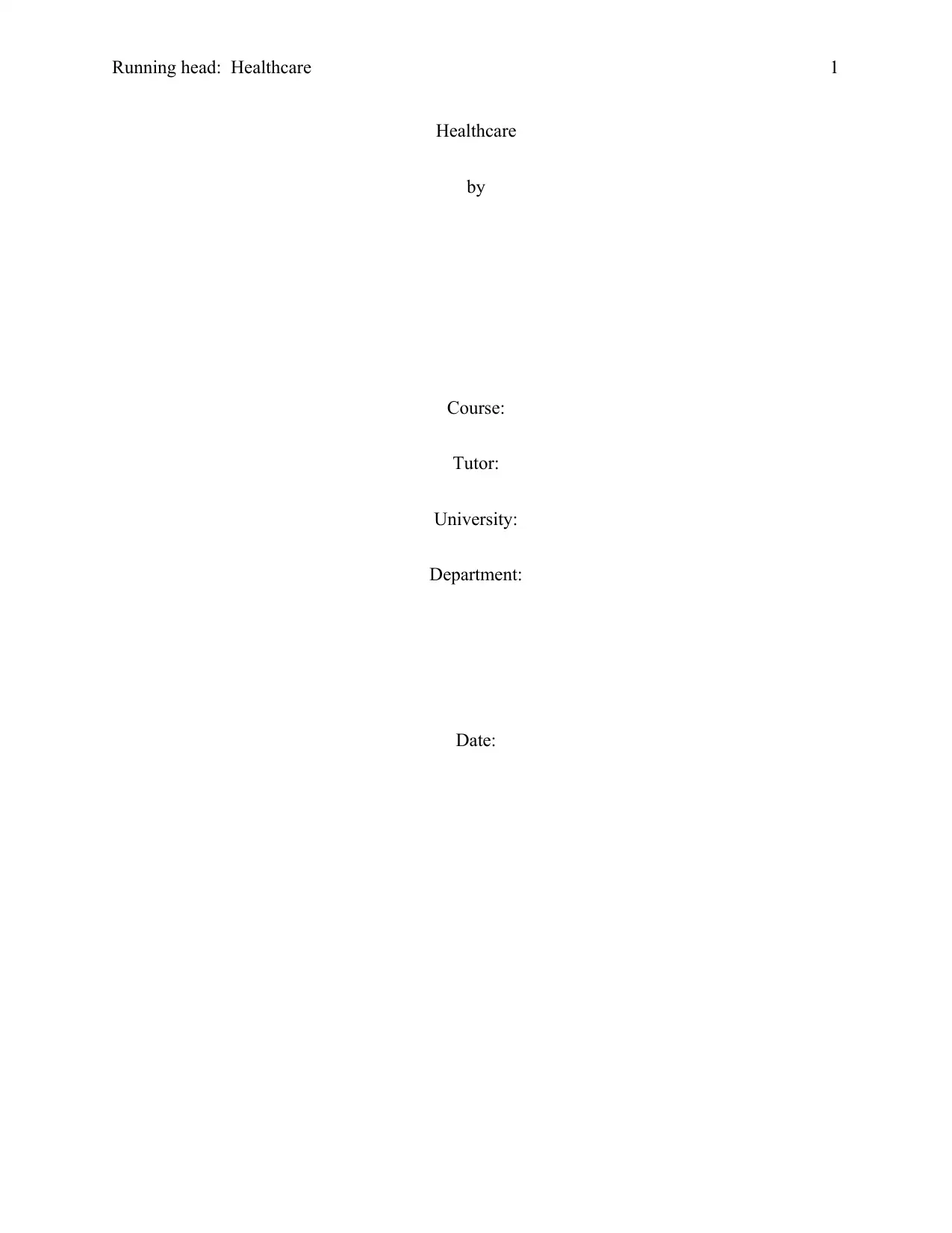
Running head: Healthcare 1
Healthcare
by
Course:
Tutor:
University:
Department:
Date:
Healthcare
by
Course:
Tutor:
University:
Department:
Date:
Paraphrase This Document
Need a fresh take? Get an instant paraphrase of this document with our AI Paraphraser
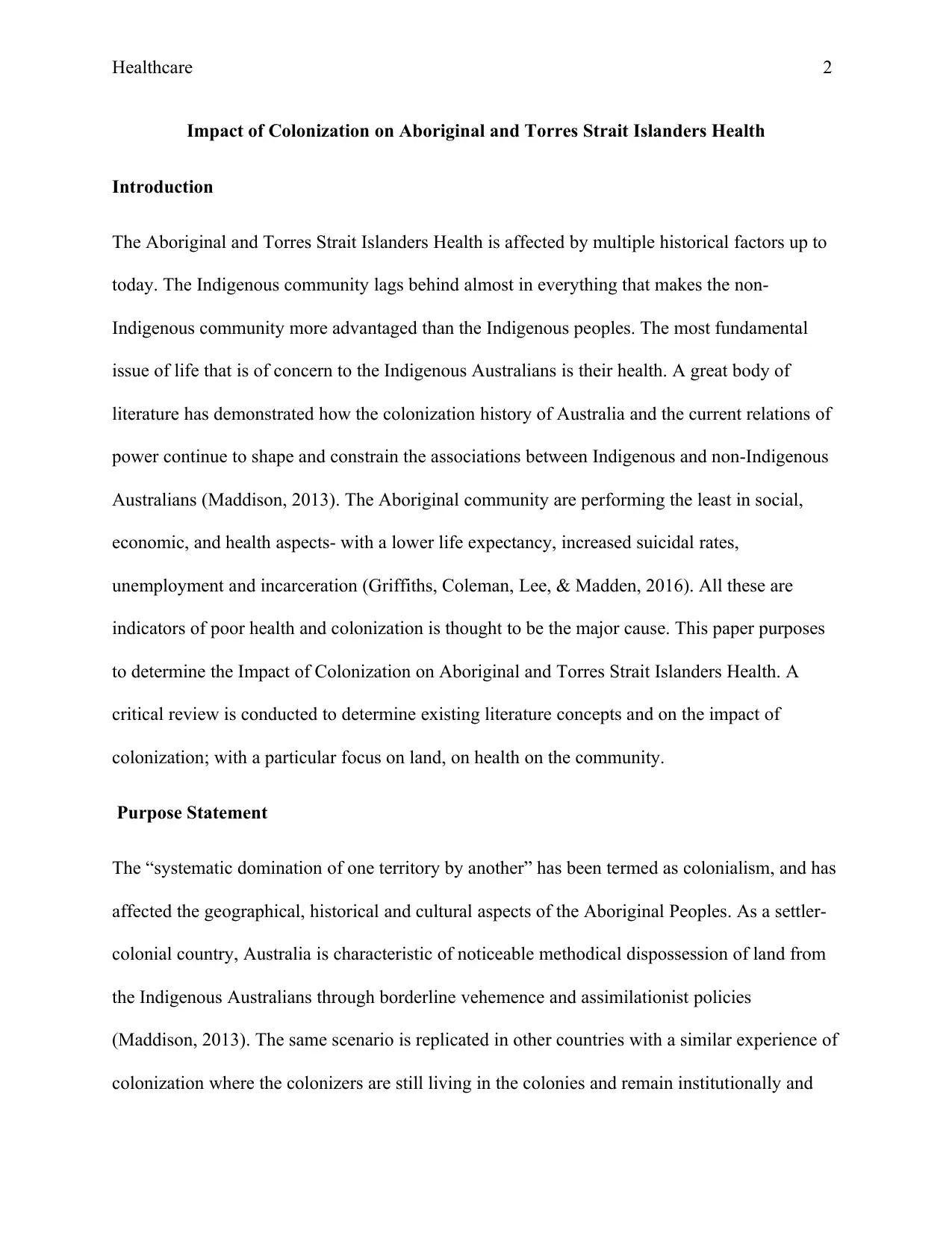
Healthcare 2
Impact of Colonization on Aboriginal and Torres Strait Islanders Health
Introduction
The Aboriginal and Torres Strait Islanders Health is affected by multiple historical factors up to
today. The Indigenous community lags behind almost in everything that makes the non-
Indigenous community more advantaged than the Indigenous peoples. The most fundamental
issue of life that is of concern to the Indigenous Australians is their health. A great body of
literature has demonstrated how the colonization history of Australia and the current relations of
power continue to shape and constrain the associations between Indigenous and non-Indigenous
Australians (Maddison, 2013). The Aboriginal community are performing the least in social,
economic, and health aspects- with a lower life expectancy, increased suicidal rates,
unemployment and incarceration (Griffiths, Coleman, Lee, & Madden, 2016). All these are
indicators of poor health and colonization is thought to be the major cause. This paper purposes
to determine the Impact of Colonization on Aboriginal and Torres Strait Islanders Health. A
critical review is conducted to determine existing literature concepts and on the impact of
colonization; with a particular focus on land, on health on the community.
Purpose Statement
The “systematic domination of one territory by another” has been termed as colonialism, and has
affected the geographical, historical and cultural aspects of the Aboriginal Peoples. As a settler-
colonial country, Australia is characteristic of noticeable methodical dispossession of land from
the Indigenous Australians through borderline vehemence and assimilationist policies
(Maddison, 2013). The same scenario is replicated in other countries with a similar experience of
colonization where the colonizers are still living in the colonies and remain institutionally and
Impact of Colonization on Aboriginal and Torres Strait Islanders Health
Introduction
The Aboriginal and Torres Strait Islanders Health is affected by multiple historical factors up to
today. The Indigenous community lags behind almost in everything that makes the non-
Indigenous community more advantaged than the Indigenous peoples. The most fundamental
issue of life that is of concern to the Indigenous Australians is their health. A great body of
literature has demonstrated how the colonization history of Australia and the current relations of
power continue to shape and constrain the associations between Indigenous and non-Indigenous
Australians (Maddison, 2013). The Aboriginal community are performing the least in social,
economic, and health aspects- with a lower life expectancy, increased suicidal rates,
unemployment and incarceration (Griffiths, Coleman, Lee, & Madden, 2016). All these are
indicators of poor health and colonization is thought to be the major cause. This paper purposes
to determine the Impact of Colonization on Aboriginal and Torres Strait Islanders Health. A
critical review is conducted to determine existing literature concepts and on the impact of
colonization; with a particular focus on land, on health on the community.
Purpose Statement
The “systematic domination of one territory by another” has been termed as colonialism, and has
affected the geographical, historical and cultural aspects of the Aboriginal Peoples. As a settler-
colonial country, Australia is characteristic of noticeable methodical dispossession of land from
the Indigenous Australians through borderline vehemence and assimilationist policies
(Maddison, 2013). The same scenario is replicated in other countries with a similar experience of
colonization where the colonizers are still living in the colonies and remain institutionally and
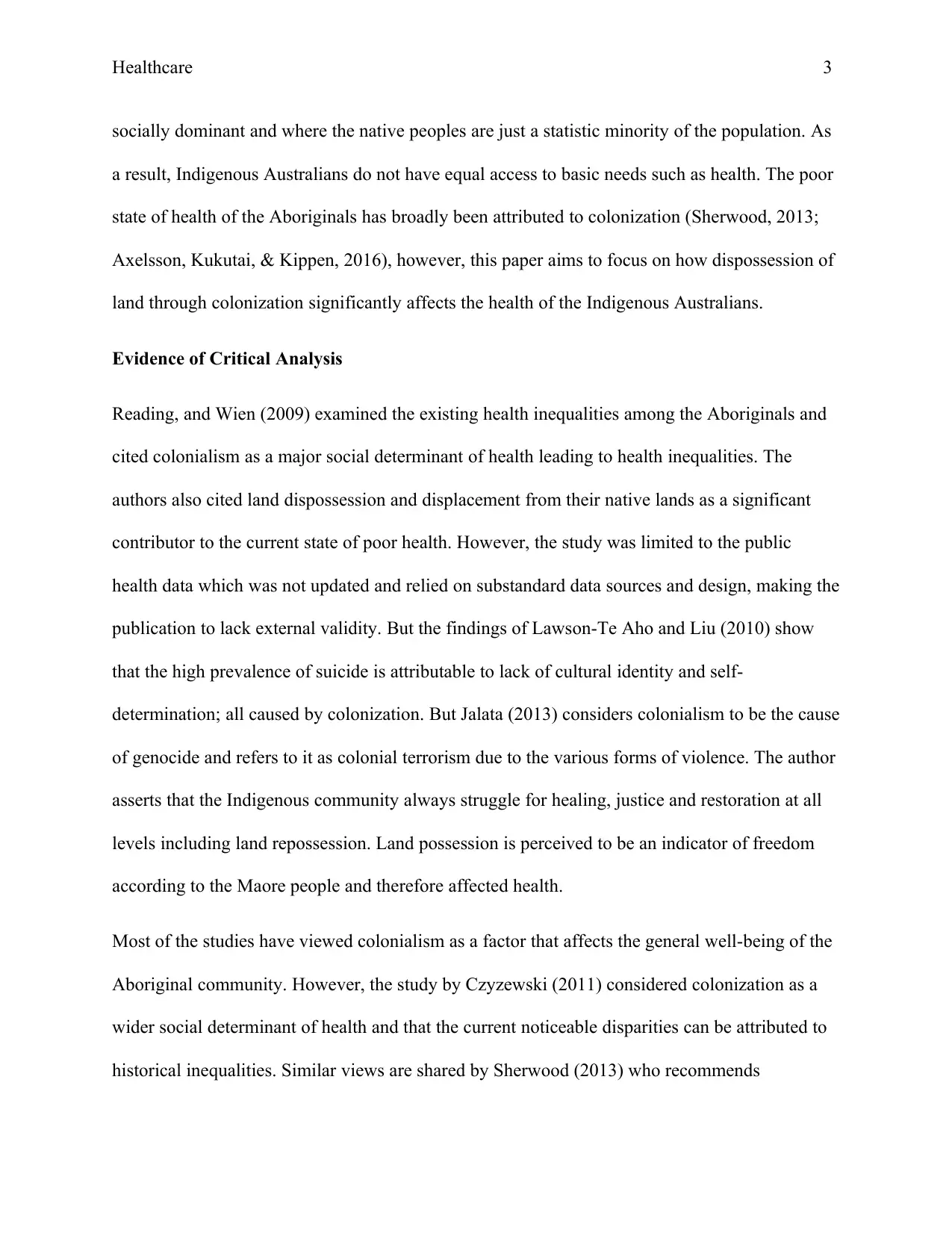
Healthcare 3
socially dominant and where the native peoples are just a statistic minority of the population. As
a result, Indigenous Australians do not have equal access to basic needs such as health. The poor
state of health of the Aboriginals has broadly been attributed to colonization (Sherwood, 2013;
Axelsson, Kukutai, & Kippen, 2016), however, this paper aims to focus on how dispossession of
land through colonization significantly affects the health of the Indigenous Australians.
Evidence of Critical Analysis
Reading, and Wien (2009) examined the existing health inequalities among the Aboriginals and
cited colonialism as a major social determinant of health leading to health inequalities. The
authors also cited land dispossession and displacement from their native lands as a significant
contributor to the current state of poor health. However, the study was limited to the public
health data which was not updated and relied on substandard data sources and design, making the
publication to lack external validity. But the findings of Lawson-Te Aho and Liu (2010) show
that the high prevalence of suicide is attributable to lack of cultural identity and self-
determination; all caused by colonization. But Jalata (2013) considers colonialism to be the cause
of genocide and refers to it as colonial terrorism due to the various forms of violence. The author
asserts that the Indigenous community always struggle for healing, justice and restoration at all
levels including land repossession. Land possession is perceived to be an indicator of freedom
according to the Maore people and therefore affected health.
Most of the studies have viewed colonialism as a factor that affects the general well-being of the
Aboriginal community. However, the study by Czyzewski (2011) considered colonization as a
wider social determinant of health and that the current noticeable disparities can be attributed to
historical inequalities. Similar views are shared by Sherwood (2013) who recommends
socially dominant and where the native peoples are just a statistic minority of the population. As
a result, Indigenous Australians do not have equal access to basic needs such as health. The poor
state of health of the Aboriginals has broadly been attributed to colonization (Sherwood, 2013;
Axelsson, Kukutai, & Kippen, 2016), however, this paper aims to focus on how dispossession of
land through colonization significantly affects the health of the Indigenous Australians.
Evidence of Critical Analysis
Reading, and Wien (2009) examined the existing health inequalities among the Aboriginals and
cited colonialism as a major social determinant of health leading to health inequalities. The
authors also cited land dispossession and displacement from their native lands as a significant
contributor to the current state of poor health. However, the study was limited to the public
health data which was not updated and relied on substandard data sources and design, making the
publication to lack external validity. But the findings of Lawson-Te Aho and Liu (2010) show
that the high prevalence of suicide is attributable to lack of cultural identity and self-
determination; all caused by colonization. But Jalata (2013) considers colonialism to be the cause
of genocide and refers to it as colonial terrorism due to the various forms of violence. The author
asserts that the Indigenous community always struggle for healing, justice and restoration at all
levels including land repossession. Land possession is perceived to be an indicator of freedom
according to the Maore people and therefore affected health.
Most of the studies have viewed colonialism as a factor that affects the general well-being of the
Aboriginal community. However, the study by Czyzewski (2011) considered colonization as a
wider social determinant of health and that the current noticeable disparities can be attributed to
historical inequalities. Similar views are shared by Sherwood (2013) who recommends
You're viewing a preview
Unlock full access by subscribing today!
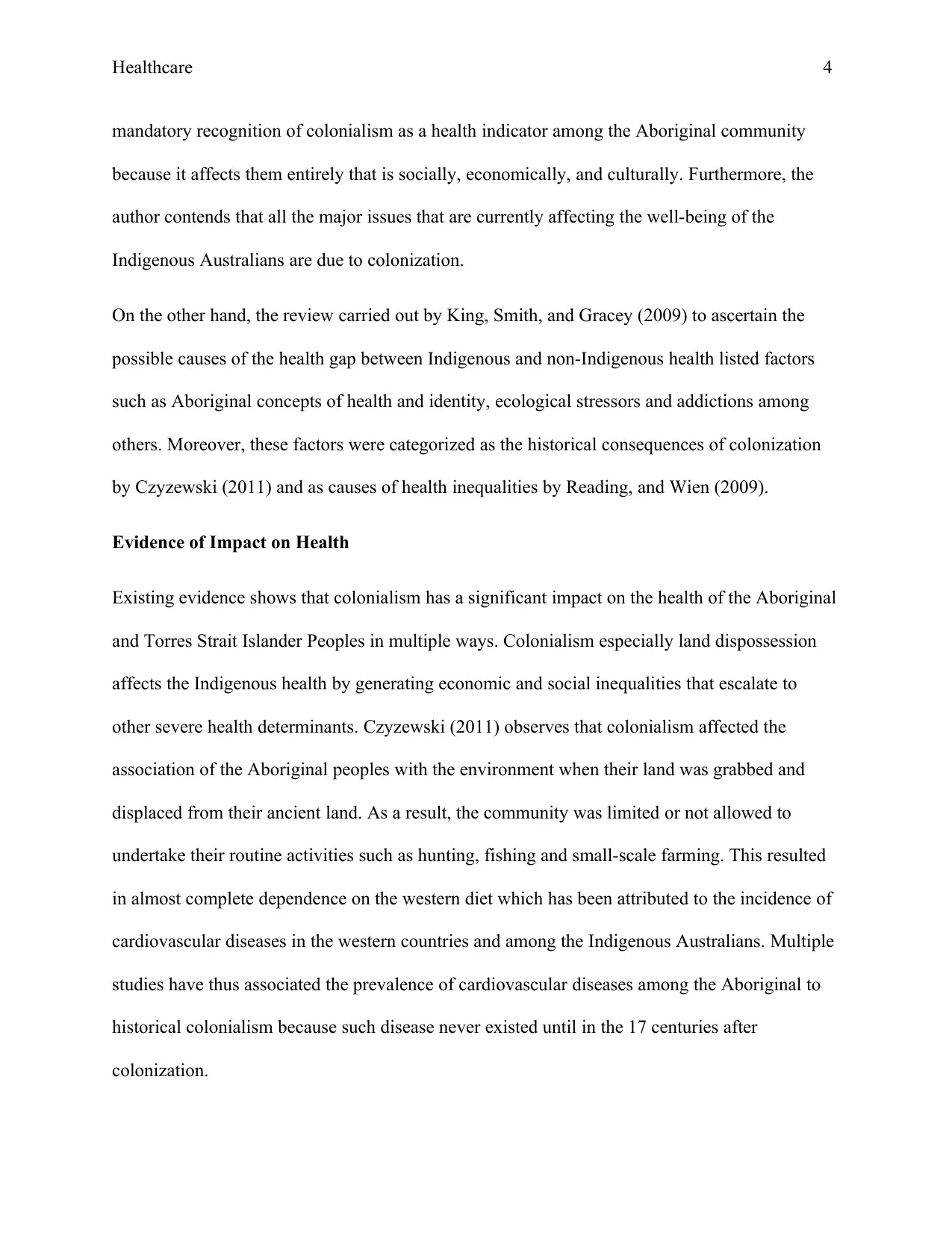
Healthcare 4
mandatory recognition of colonialism as a health indicator among the Aboriginal community
because it affects them entirely that is socially, economically, and culturally. Furthermore, the
author contends that all the major issues that are currently affecting the well-being of the
Indigenous Australians are due to colonization.
On the other hand, the review carried out by King, Smith, and Gracey (2009) to ascertain the
possible causes of the health gap between Indigenous and non-Indigenous health listed factors
such as Aboriginal concepts of health and identity, ecological stressors and addictions among
others. Moreover, these factors were categorized as the historical consequences of colonization
by Czyzewski (2011) and as causes of health inequalities by Reading, and Wien (2009).
Evidence of Impact on Health
Existing evidence shows that colonialism has a significant impact on the health of the Aboriginal
and Torres Strait Islander Peoples in multiple ways. Colonialism especially land dispossession
affects the Indigenous health by generating economic and social inequalities that escalate to
other severe health determinants. Czyzewski (2011) observes that colonialism affected the
association of the Aboriginal peoples with the environment when their land was grabbed and
displaced from their ancient land. As a result, the community was limited or not allowed to
undertake their routine activities such as hunting, fishing and small-scale farming. This resulted
in almost complete dependence on the western diet which has been attributed to the incidence of
cardiovascular diseases in the western countries and among the Indigenous Australians. Multiple
studies have thus associated the prevalence of cardiovascular diseases among the Aboriginal to
historical colonialism because such disease never existed until in the 17 centuries after
colonization.
mandatory recognition of colonialism as a health indicator among the Aboriginal community
because it affects them entirely that is socially, economically, and culturally. Furthermore, the
author contends that all the major issues that are currently affecting the well-being of the
Indigenous Australians are due to colonization.
On the other hand, the review carried out by King, Smith, and Gracey (2009) to ascertain the
possible causes of the health gap between Indigenous and non-Indigenous health listed factors
such as Aboriginal concepts of health and identity, ecological stressors and addictions among
others. Moreover, these factors were categorized as the historical consequences of colonization
by Czyzewski (2011) and as causes of health inequalities by Reading, and Wien (2009).
Evidence of Impact on Health
Existing evidence shows that colonialism has a significant impact on the health of the Aboriginal
and Torres Strait Islander Peoples in multiple ways. Colonialism especially land dispossession
affects the Indigenous health by generating economic and social inequalities that escalate to
other severe health determinants. Czyzewski (2011) observes that colonialism affected the
association of the Aboriginal peoples with the environment when their land was grabbed and
displaced from their ancient land. As a result, the community was limited or not allowed to
undertake their routine activities such as hunting, fishing and small-scale farming. This resulted
in almost complete dependence on the western diet which has been attributed to the incidence of
cardiovascular diseases in the western countries and among the Indigenous Australians. Multiple
studies have thus associated the prevalence of cardiovascular diseases among the Aboriginal to
historical colonialism because such disease never existed until in the 17 centuries after
colonization.
Paraphrase This Document
Need a fresh take? Get an instant paraphrase of this document with our AI Paraphraser
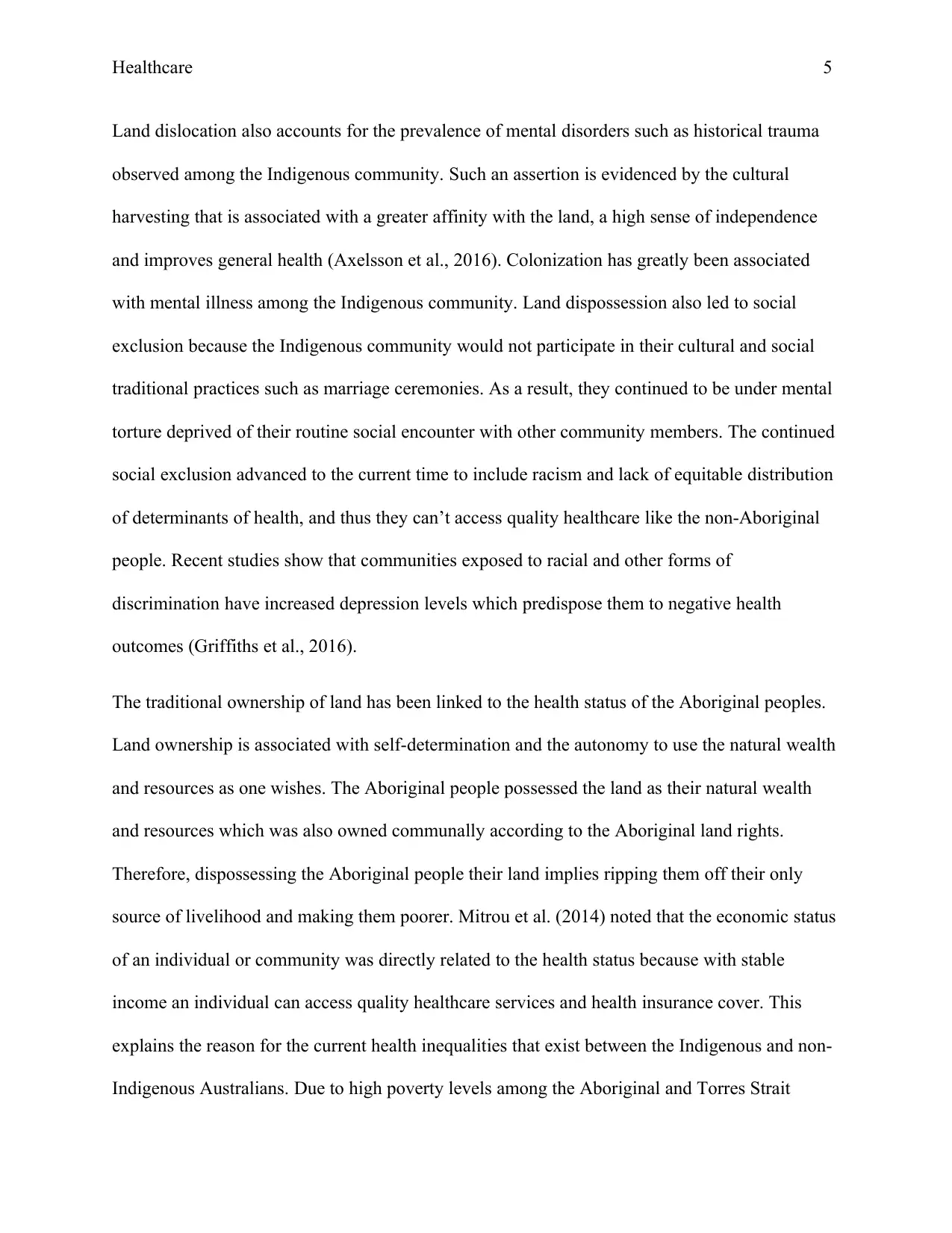
Healthcare 5
Land dislocation also accounts for the prevalence of mental disorders such as historical trauma
observed among the Indigenous community. Such an assertion is evidenced by the cultural
harvesting that is associated with a greater affinity with the land, a high sense of independence
and improves general health (Axelsson et al., 2016). Colonization has greatly been associated
with mental illness among the Indigenous community. Land dispossession also led to social
exclusion because the Indigenous community would not participate in their cultural and social
traditional practices such as marriage ceremonies. As a result, they continued to be under mental
torture deprived of their routine social encounter with other community members. The continued
social exclusion advanced to the current time to include racism and lack of equitable distribution
of determinants of health, and thus they can’t access quality healthcare like the non-Aboriginal
people. Recent studies show that communities exposed to racial and other forms of
discrimination have increased depression levels which predispose them to negative health
outcomes (Griffiths et al., 2016).
The traditional ownership of land has been linked to the health status of the Aboriginal peoples.
Land ownership is associated with self-determination and the autonomy to use the natural wealth
and resources as one wishes. The Aboriginal people possessed the land as their natural wealth
and resources which was also owned communally according to the Aboriginal land rights.
Therefore, dispossessing the Aboriginal people their land implies ripping them off their only
source of livelihood and making them poorer. Mitrou et al. (2014) noted that the economic status
of an individual or community was directly related to the health status because with stable
income an individual can access quality healthcare services and health insurance cover. This
explains the reason for the current health inequalities that exist between the Indigenous and non-
Indigenous Australians. Due to high poverty levels among the Aboriginal and Torres Strait
Land dislocation also accounts for the prevalence of mental disorders such as historical trauma
observed among the Indigenous community. Such an assertion is evidenced by the cultural
harvesting that is associated with a greater affinity with the land, a high sense of independence
and improves general health (Axelsson et al., 2016). Colonization has greatly been associated
with mental illness among the Indigenous community. Land dispossession also led to social
exclusion because the Indigenous community would not participate in their cultural and social
traditional practices such as marriage ceremonies. As a result, they continued to be under mental
torture deprived of their routine social encounter with other community members. The continued
social exclusion advanced to the current time to include racism and lack of equitable distribution
of determinants of health, and thus they can’t access quality healthcare like the non-Aboriginal
people. Recent studies show that communities exposed to racial and other forms of
discrimination have increased depression levels which predispose them to negative health
outcomes (Griffiths et al., 2016).
The traditional ownership of land has been linked to the health status of the Aboriginal peoples.
Land ownership is associated with self-determination and the autonomy to use the natural wealth
and resources as one wishes. The Aboriginal people possessed the land as their natural wealth
and resources which was also owned communally according to the Aboriginal land rights.
Therefore, dispossessing the Aboriginal people their land implies ripping them off their only
source of livelihood and making them poorer. Mitrou et al. (2014) noted that the economic status
of an individual or community was directly related to the health status because with stable
income an individual can access quality healthcare services and health insurance cover. This
explains the reason for the current health inequalities that exist between the Indigenous and non-
Indigenous Australians. Due to high poverty levels among the Aboriginal and Torres Strait
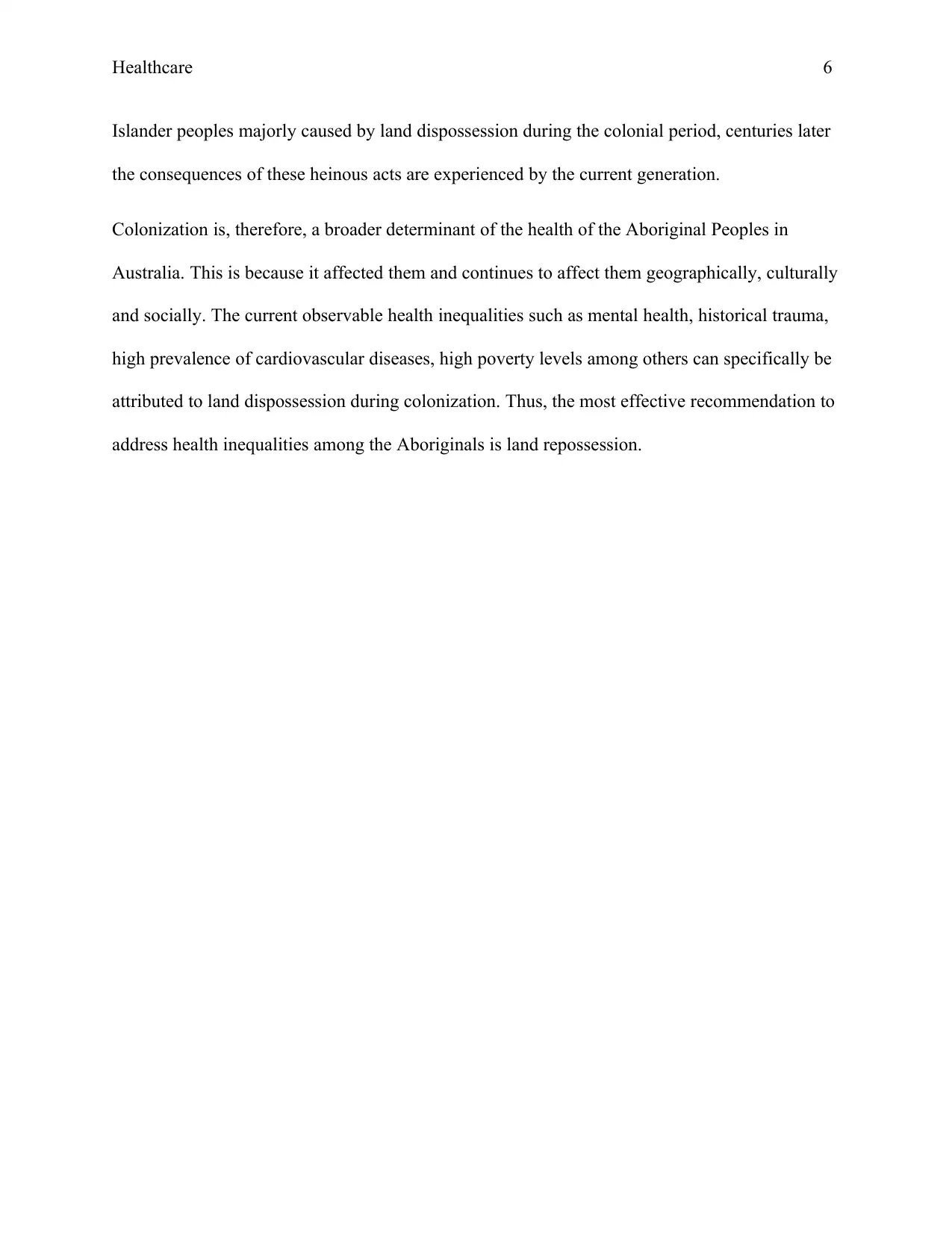
Healthcare 6
Islander peoples majorly caused by land dispossession during the colonial period, centuries later
the consequences of these heinous acts are experienced by the current generation.
Colonization is, therefore, a broader determinant of the health of the Aboriginal Peoples in
Australia. This is because it affected them and continues to affect them geographically, culturally
and socially. The current observable health inequalities such as mental health, historical trauma,
high prevalence of cardiovascular diseases, high poverty levels among others can specifically be
attributed to land dispossession during colonization. Thus, the most effective recommendation to
address health inequalities among the Aboriginals is land repossession.
Islander peoples majorly caused by land dispossession during the colonial period, centuries later
the consequences of these heinous acts are experienced by the current generation.
Colonization is, therefore, a broader determinant of the health of the Aboriginal Peoples in
Australia. This is because it affected them and continues to affect them geographically, culturally
and socially. The current observable health inequalities such as mental health, historical trauma,
high prevalence of cardiovascular diseases, high poverty levels among others can specifically be
attributed to land dispossession during colonization. Thus, the most effective recommendation to
address health inequalities among the Aboriginals is land repossession.
You're viewing a preview
Unlock full access by subscribing today!
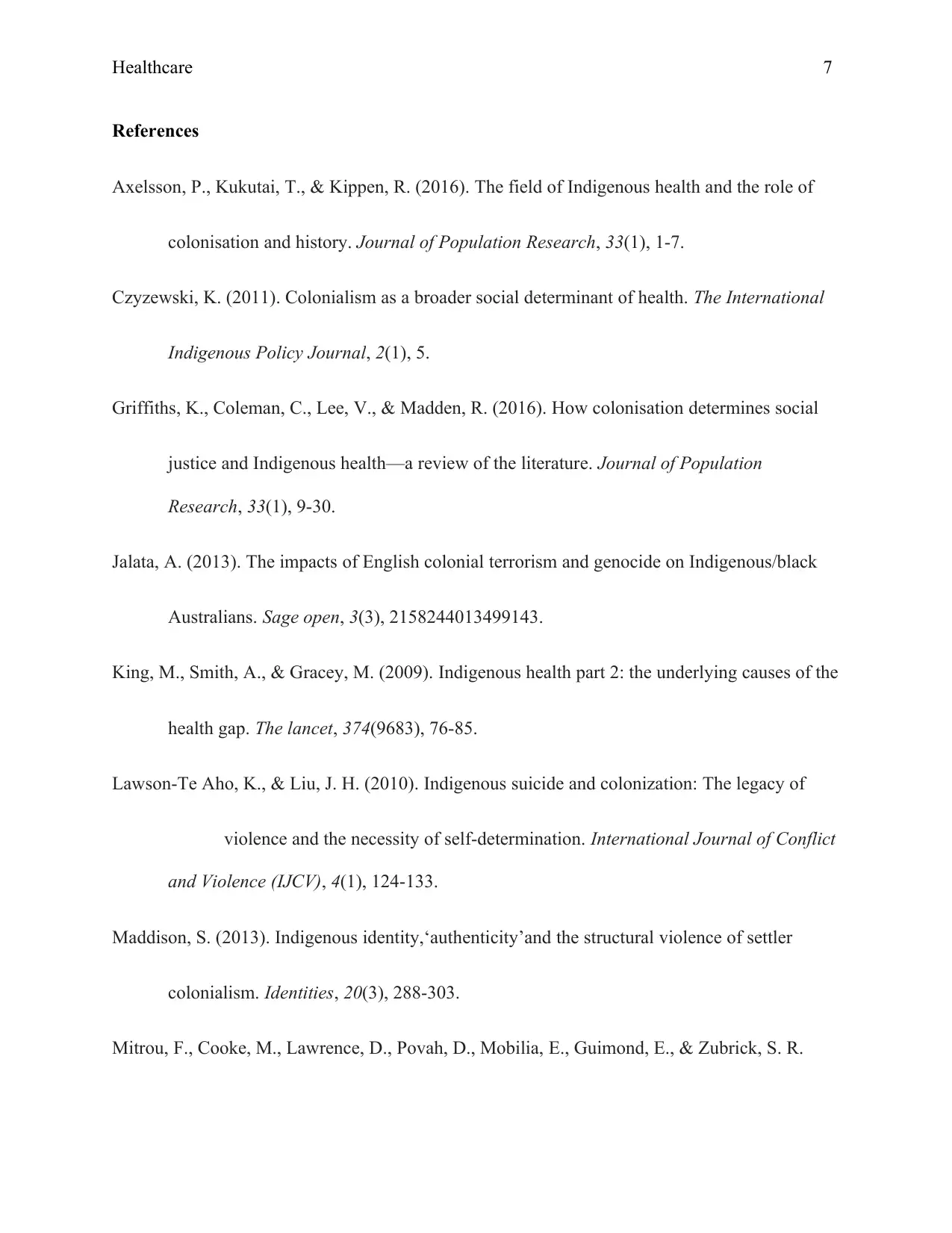
Healthcare 7
References
Axelsson, P., Kukutai, T., & Kippen, R. (2016). The field of Indigenous health and the role of
colonisation and history. Journal of Population Research, 33(1), 1-7.
Czyzewski, K. (2011). Colonialism as a broader social determinant of health. The International
Indigenous Policy Journal, 2(1), 5.
Griffiths, K., Coleman, C., Lee, V., & Madden, R. (2016). How colonisation determines social
justice and Indigenous health—a review of the literature. Journal of Population
Research, 33(1), 9-30.
Jalata, A. (2013). The impacts of English colonial terrorism and genocide on Indigenous/black
Australians. Sage open, 3(3), 2158244013499143.
King, M., Smith, A., & Gracey, M. (2009). Indigenous health part 2: the underlying causes of the
health gap. The lancet, 374(9683), 76-85.
Lawson-Te Aho, K., & Liu, J. H. (2010). Indigenous suicide and colonization: The legacy of
violence and the necessity of self-determination. International Journal of Conflict
and Violence (IJCV), 4(1), 124-133.
Maddison, S. (2013). Indigenous identity,‘authenticity’and the structural violence of settler
colonialism. Identities, 20(3), 288-303.
Mitrou, F., Cooke, M., Lawrence, D., Povah, D., Mobilia, E., Guimond, E., & Zubrick, S. R.
References
Axelsson, P., Kukutai, T., & Kippen, R. (2016). The field of Indigenous health and the role of
colonisation and history. Journal of Population Research, 33(1), 1-7.
Czyzewski, K. (2011). Colonialism as a broader social determinant of health. The International
Indigenous Policy Journal, 2(1), 5.
Griffiths, K., Coleman, C., Lee, V., & Madden, R. (2016). How colonisation determines social
justice and Indigenous health—a review of the literature. Journal of Population
Research, 33(1), 9-30.
Jalata, A. (2013). The impacts of English colonial terrorism and genocide on Indigenous/black
Australians. Sage open, 3(3), 2158244013499143.
King, M., Smith, A., & Gracey, M. (2009). Indigenous health part 2: the underlying causes of the
health gap. The lancet, 374(9683), 76-85.
Lawson-Te Aho, K., & Liu, J. H. (2010). Indigenous suicide and colonization: The legacy of
violence and the necessity of self-determination. International Journal of Conflict
and Violence (IJCV), 4(1), 124-133.
Maddison, S. (2013). Indigenous identity,‘authenticity’and the structural violence of settler
colonialism. Identities, 20(3), 288-303.
Mitrou, F., Cooke, M., Lawrence, D., Povah, D., Mobilia, E., Guimond, E., & Zubrick, S. R.
Paraphrase This Document
Need a fresh take? Get an instant paraphrase of this document with our AI Paraphraser
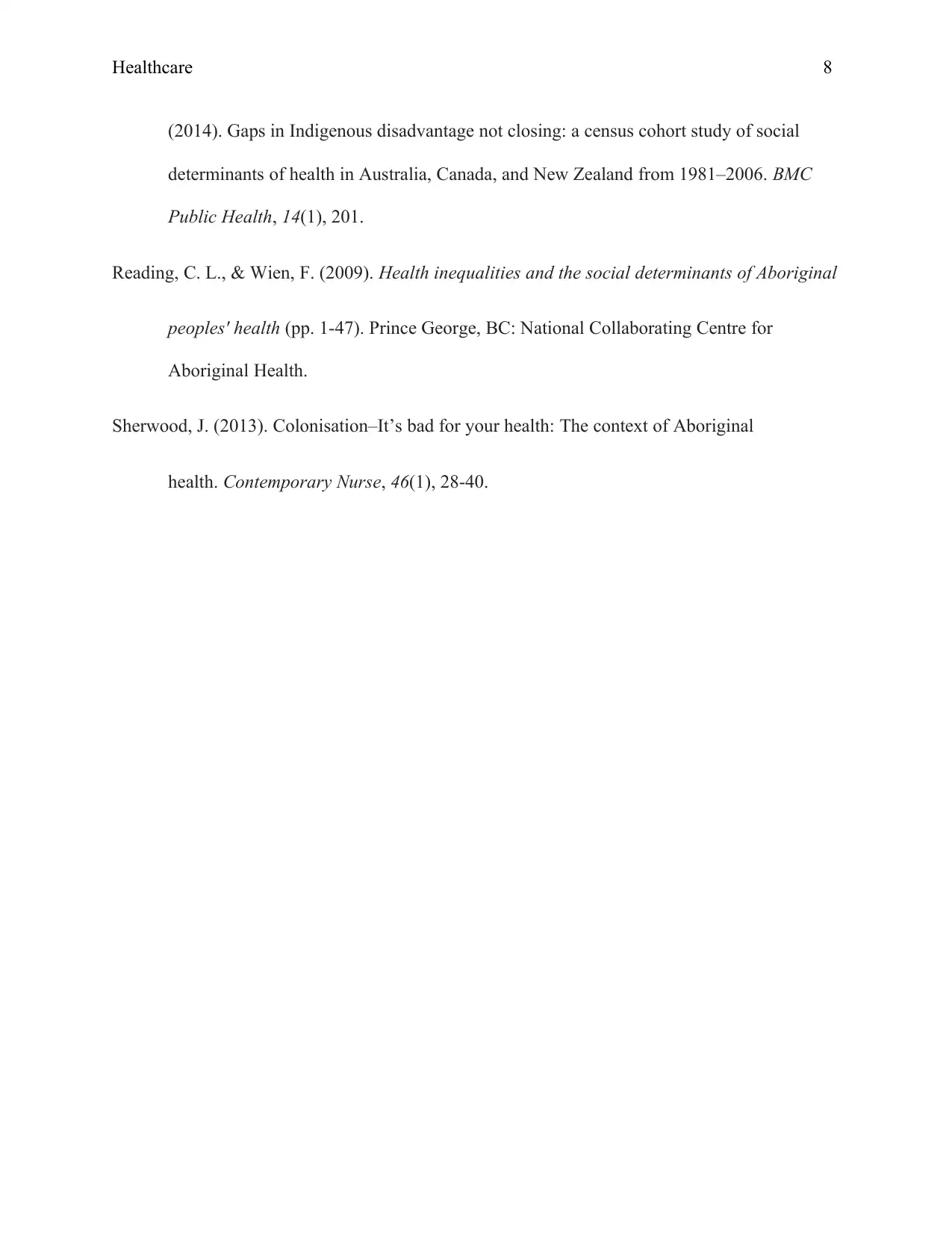
Healthcare 8
(2014). Gaps in Indigenous disadvantage not closing: a census cohort study of social
determinants of health in Australia, Canada, and New Zealand from 1981–2006. BMC
Public Health, 14(1), 201.
Reading, C. L., & Wien, F. (2009). Health inequalities and the social determinants of Aboriginal
peoples' health (pp. 1-47). Prince George, BC: National Collaborating Centre for
Aboriginal Health.
Sherwood, J. (2013). Colonisation–It’s bad for your health: The context of Aboriginal
health. Contemporary Nurse, 46(1), 28-40.
(2014). Gaps in Indigenous disadvantage not closing: a census cohort study of social
determinants of health in Australia, Canada, and New Zealand from 1981–2006. BMC
Public Health, 14(1), 201.
Reading, C. L., & Wien, F. (2009). Health inequalities and the social determinants of Aboriginal
peoples' health (pp. 1-47). Prince George, BC: National Collaborating Centre for
Aboriginal Health.
Sherwood, J. (2013). Colonisation–It’s bad for your health: The context of Aboriginal
health. Contemporary Nurse, 46(1), 28-40.
1 out of 8
Related Documents
Your All-in-One AI-Powered Toolkit for Academic Success.
+13062052269
info@desklib.com
Available 24*7 on WhatsApp / Email
![[object Object]](/_next/static/media/star-bottom.7253800d.svg)
Unlock your academic potential
© 2024 | Zucol Services PVT LTD | All rights reserved.





